Over & Overs: Amadeus (1984)
 Tuesday, March 2, 2021 at 1:30PM
Tuesday, March 2, 2021 at 1:30PM To celebrate the recent centennial of sound mixer turned movie producer Saul Zaentz, I decided to revisit my favorite of his projects, the glorious marvel that is Amadeus (the second of his three Best Picture winners). On paper, the movie may sound like the most airless and insufferable of Oscar champions. It's a musician's biopic, probably my least favorite of prestige subgenres, whose take on history is closer to feverish invention than thoughtful analysis. With a theatrical cut running for nearly three hours, the movie's a behemoth of excess in a decade when the Academy was prone to shower such things with undeserved accolades. Nevertheless, I find myself besotted by Milos Forman's 1984 Best Picture winner, its meditations on mediocrity and spiritual discontentment, its celebration of opera, the lushness of its emotions...
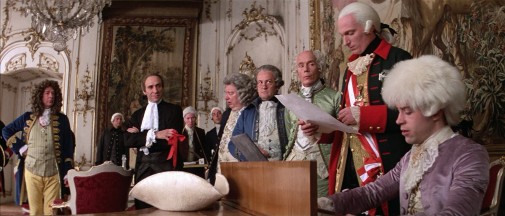
Peter Shaffer did the job of adapting his 1979 play and the result is a robust re-imagining of the text, seamlessly translated to the screen without denying its ties to theatrical traditional. So much so that this is one of the few film credits of legendary stage director Josef Svoboda. The Czech artist conceived the numerous stage shows we see throughout the movie, from Mozart's ebullient operas to Salieri's sepulchral piece of Baroque drama to a carnivalesque parody of all the above. In any case, Daniel Walber already went in-depth into the paper opulence of Svoboda's 18th-century stagings, so we should focus on other matters.
Rather than being the story of Wolfgang Amadeus Mozart's last decade, this is a confession made from the recollections of Antonio Salieri. A composer colleague of the Austrian genius, he was also his bitter rival who conspired to bring him to premature death. Such rivalry is utterly fictional by all historical records, but that's irrelevant when discussing Amadeus. Forman, Shaffer, and Zaentz aren't trying to dramatize history nor are they pretending to do so as many other prestige filmmakers would. Like Mozart's operas, Amadeus is popular art, not a school lesson. It's entertainment for the masses that isn't ashamed of that status.

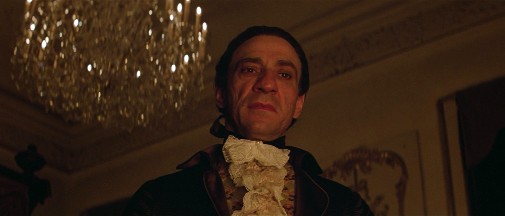
Going back to another artistic titan from past centuries, the attitude Amadeus demonstrates towards history is much of the same displayed by Shakespeare when writing about English monarchy. The real-life figures are meat puppets that confer a sense of dramatic weight to what is, in essence, the character study of a psychologically complex personality. You can get away with that when the execution is this pristine, when the characterizations are this juicy. F. Murray Abraham's Salieri is among the best depictions of a dissatisfied artist in American cinema. A shattered kaleidoscope of unconvincing lies, smugness, and Machiavellian intent, this Salieri is the self-proclaimed patron saint of all mediocre people, a master of intransigence, a monster of self-flagellation.
He's a man drowning in ambition and reflective hatred, imposter syndrome made flesh. We witness as his spirit is rotted by curdled envy, the forsaking of a cruel God. Abraham portrays this sorry creature through a meticulous strategy of filigreed gesture and mellifluous oratory. The actor punctuates this with some amazing details like the epicurean Nirvana the man feels whenever he tastes a sweet treat or his passionate response to Mozart's creations. Watching the two men communicate through music is one of the movie's greatest marvels. What's perhaps most interesting is that Amadeus doesn't go out of its way to defame Salieri as the mediocre artist he proclaims himself to be. Such ill descriptions come from the man's vision of himself, not from the filmmaker's conspicuous efforts.
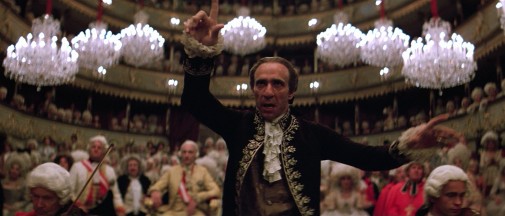
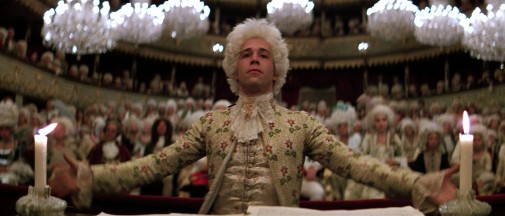
If Salieri's compositions pale in comparison to Mozart's, it's because most works of music can't hold a candle to that man's once-in-a-generation talent. Tom Hulce's Mozart is less impressive than Abraham's Oscar-winning work but he's just as specific and delightful when playing this larger-than-life character. There's little subtlety in the actor's filthy take on the genius composer, though that's not the mark of an undisciplined performance. There's precision to his hyena-like giggle, the palpable need for attention and parental approval. For as much as Salieri's narration attacks Mozart for a lack of monastic devotion to music, Hulce lets us see the pride of the artist, how dependent his sanity is on the creative act, and how that's the source of his ruination.
All this praise doesn't mean I'm blind to the picture's faults. The thing about re-watching movies as consistently as I do Amadeus is that the perception of the film grows along with the viewer. The dueling perspectives of Salieri and Mozart don't make sense within the narrative through-line, no matter how compelling they both are. Furthermore, the fleshy, blunt recreation of 1780s Vienna isn't without a macula. The set design and cinematography are exquisite, while most of the costumes are on the wrong side of anachronistic cinema. All those visible zippers and polyester satin look cheap instead of purposefully irreverent. This is evident when we compare the clothes to the zany wig design which strides the line between period recreation and rollicking artifice with more success.
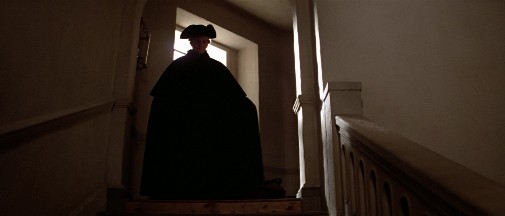
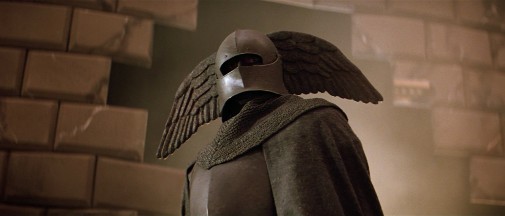
The best of Saul Zaentz's three Oscar champions, Amadeus is the first movie I ever updated from DVD to Blu-Ray because the disc was so worn down. My love runs deep, though I realize my description of its merits may suggest a more punitive watch than the reality. Amadeus is a depiction of the toxic dynamic of two self-destructive individuals, a rhapsodic depiction of jealousy at its most soul-destroying, of lost faith at its most defeatist. However, from the propulsive cutting to the heavenly soundtrack, Amadeus never drags, never exhausts even as it presents the audience with a tragedy. Like its version of Mozart recreates his father's recriminating ghost in Don Giovanni's hellish conclusion, the movie shapes human suffering into splendorous pageantry.
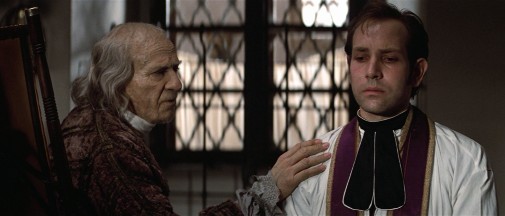
Thank you, Saul Zaentz. Thank you for this endlessly re-watchable movie miracle.



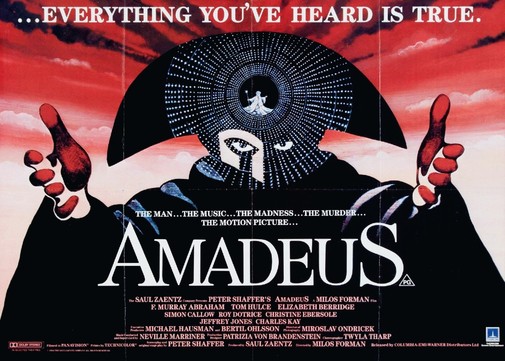
Reader Comments (19)
Recently saw this for the first time during my backwards journey through all the best picture nominees. I liked it, didn’t love it. Like most movies that use the device, I don’t think it needed the wraparound story.. or at least a lot less of it. I felt like every time narrative momentum was building, we cut back to in-person narration.
I also liked Tom Hulce just a smidge better than Abraham, but both were great. Love the stat of this being one of the few movies with two lead acting noms in the same category.
I realize I am in the minority, but I am resolved that Amadeus will remain regrettable for me. I had the joy of seeing the great Ian McKellen play Salieri on stage. He was magnificent. Subsequent productions and the film pale in the memory of his towering performance. Milos Forman’s ardent refusal to allow those from stage productions to play the role again in his film adaptations is lamentable. The pinnacle of a great actor’s career was lost.
I think Abraham is one of the best winners rarely discussed cos he's not a star,Elizabeth Berridge was snubbed for S/Actress and I don't get why,she's even better in the Directo's Cut.
Thankyou for discussing 1984 an often overlooked year.
I never tire of it. Top ten for me.
James -- i've often wondered about that. It's strange because the leads on stage were already stars and usually filmmakers replace leads specifically because people don't know who they are and opt for btter known playrs. In this case it was the opposite!
Though seeing the competition between Mozart and Salieri is fun to watch, the aspect of this movie that absolutely thrilled me was the music and the various styles of music. Having always been a closet classical lover, I felt this movie threw open the doors to the making of one of classical music's geniuses. I've watched it again and it's just as thrilling.
James and Nathaniel -- I understand Forman wanted the two leads to be played by american actors, which is why McKellen and Curry were not selected; same with Kenneth Branagh, who I think had been considered, if not the first choice, for the role of Mozart.
Yes, this is the definition of an "over and over" for me. I have loved this one since I first saw it as a kid. It's perhaps my favorite Best Picture winner of all-time, and I don't know if it will ever be displaced. The two leads are perfection for me as well.
This is such an entertaining film. Everything about it works - the character introductions, the drama, the ending, the use of music. It's three hours, but never feels like it. I've seen it a few times, and this makes me want to rewatch it.
They speak of "the Oscar curse" and give as example F. Murray Abraham. But without the Oscar, his film career would be different from what it became ?
One of the best films ever though Saul Zaentz's legacy is one that is mixed. Yes, he's a great film producer that will create work that was considered challenging and should be commended for it. Yet, he's also done some bad things in regards for his work in the music industry such as his feud with John Fogerty over the ownership to the music of Creedence Clearwater Revival as Zaentz made a lot of money from that music with Fogerty getting very little until the last decade.
Wonderful movie that you never tire of watching. Perfect from start to finish.
What a great movie. Exactly what a biopic should be, totally fun and entertaining while not taking its subjects too seriously.
My #2 movie of all time. As mentioned in the article, this trascends the biopic aspect and delivers a monumental reflection on jealousy, envy, guilt and what human beings can do to destroy others and themselves (and the fact that Peter Shaffer was gay kinda gives this a deliciously wicked queer subtext to the whole thing)
And Abraham is my favorite Best Actor winner ever,
Call me theater snob, but I saw Paul scofield, simon callow and the wonderfull felicity kendall in the first run in London. Can 't believe anyone could be better.
Call me theater snob, but I saw Paul scofield, simon callow and the wonderfull felicity kendall in the first run in London. Can 't believe anyone could be better.
This is my time when I mention that the theatrical cut > the director's cut that seems to be the only HD version around. But you can acquire it...through the internet...
"it's because most works of music can't hold a candle to that man's once-in-a-generation talent."
You truly are the Mozart of The Film Experience. Hopefully the other writers don't go quite as mad as Salieri. :)
I first saw this when I was about 11, via VHS when I was bored. With no clue what I was about to experience. This will always be in my top 3 all time. Thanks for the write up.